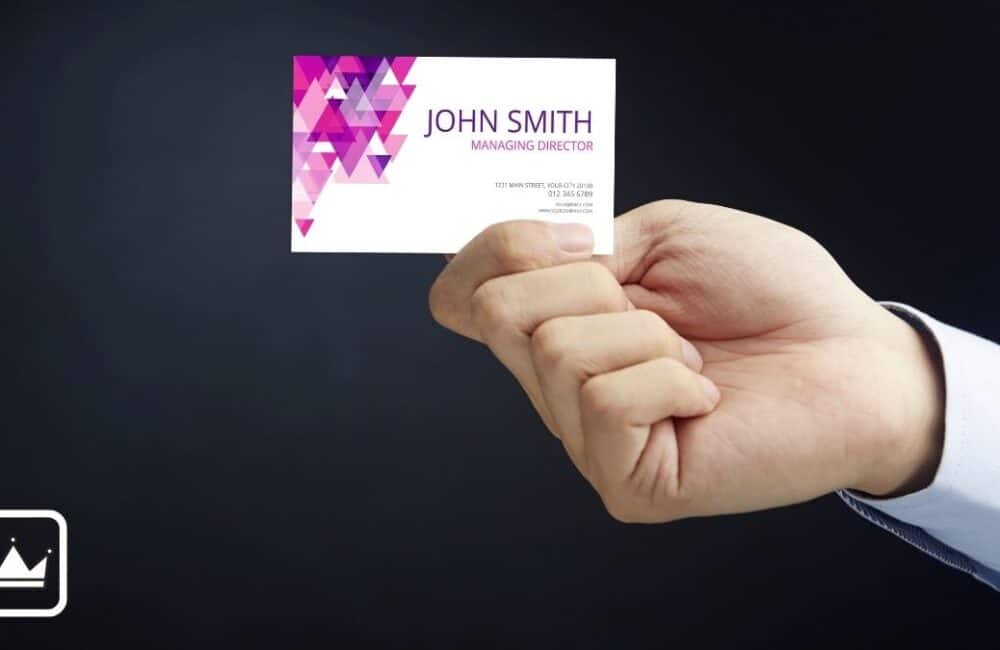In search of key reasons why business cards are still important? Then this article is for you! We have wrapped all the reasons you need to know about the significance of business cards today.
Introduction
In today’s digital age, at which point communication is primarily done through emails, social media, and other online platforms, it may sound like business cards have become outdated.
Though, as a professional author who has attended numerous networking events and conferences, I can with confidence say that business cards still hold immense value in the business world.
Don’t you believe? Here are the statistics:
According to Graphicszoo, about 39% of people wouldn’t do business with someone with a “cheap-looking” business card. The same source says 72% of people judge a company or person by their business card’s quality. According to 78% of people, colored cards are more memorable than white ones.
In this blog post, I will explore 12 key reasons why business cards are still important and why they should not be overlooked.
- What is a Business card and what is it used for?
- Are Business cards still relevant in 2024?
- Business Card vs. No Business Card: A Comparative Overview
- 12 Reasons Why Business Cards Are Still Important
- 1. Business Cards are a Reflection of Your Professionalism
- 2. Business Cards Help You Stand Out in a Crowded Market
- 3. It’s a Convenient Way to Share Your Contact Information
- 4. More Personal than Digital Contacts
- 5. It Can Help You Build Stronger Relationships with Clients
- 6. Business Cards are a Cost-Effective Marketing Tool
- 7. Help You Establish Your Brand Identity
- 8. Help You Make a Lasting Impression
- 9. Still Widely Used in Business Settings
- 10. Help You Network More Effectively
- 11. A Tangible Reminder of Your Business
- 12. Help You Generate Referrals and Repeat Business
- What Should Be Included In A Business Card?
- How To Design An Effective Business Card?
- Conclusion
- FAQs
Key Takeaways
- Business cards reflect your professionalism
- Business cards help you stand out in a crowded market
- Business cards are a convenient way to share your contact information
- Business cards can help you build robust relationships with clients
- Business cards are still broadly used in business settings
What is a Business card and what is it used for?
A business card is a small card that includes essential information about me or my company. When I meet new people, I share my business card with them. It’s like a convenient memory aid. Here’s what you’ll ordinarily find on a business card:
- My Name
- My Title
- Company Name
- Contact Information (phone number, email address, website)
- Logo
The standard size for a business card is 3.5 inches by 2 inches. But, there are also square and vertical variations. Most business cards are printed on 14pt cardstock, although you can choose other types of paper like recycled or metallic paper.
Business cards perform a substantial role in networking and professional communication across various industries. Diverse types of business cards cater to specific needs:
- Construction Business Card: For construction companies, providing contact details for future clients and contractors.
- Medical Business Card: Exercised by medical facilities and professionals to share fundamental contact information with patients.
- HR Business Card: HR firms and professionals use these to showcase company details.
- IT/Software Business Card: Sleek designs for tech companies to network and draw clients.
- Fashion Business Card: Essential for fashion designers and industry professionals.
- Advertising Business Card: Helps present advertising businesses professionally.
Always remember, a business card is beyond just a piece of paper—it’s a bridge to connect with others in the business world!
Are Business cards still relevant in 2024?
Yes, business cards are still relevant in 2024 and beyond. Despite technology has transformed the way we connect and share information, business cards persist in playing a crucial role in professional networking. Let me explain why:
- Branding Consistency: As business professionals, we realize the importance of branding. Business cards function as a tangible extension of our brand. Consistent branding across various channels, including business cards, reinforces our identity and credibility.
- Origins and Purpose: Business cards have a wealthy history. They originated centuries ago, evolving from “calling cards” exchanged by the European gentry to promote social connections. The primary purpose of business cards keep them stable:
- Remembering Names: A well-designed card helps people recall your name and contact information for future communication.
- Inviting Collaboration: It subtly invites collaboration or further interaction.
- Professional Image: A thoughtfully designed card reflects professionalism and sophistication.
- Personal Branding: It boosts your brand and business to beneficiaries and others they may converse with.
- Digital Complement: While smartphones and online profiles authorize us to exchange information right away, business cards still have their place. Modern business cards typically involve email addresses, URLs, or QR codes linking to websites or social media profiles. Some professionals even utilize “digital business cards” stored on their phones for easy sharing in the course of virtual events.
In brief, business cards are a tangible reminder of our maestro identity, and when used alongside digital media, they enhance our networking efforts.
So, don’t underestimate the power of a well-crafted business card—it surpasses just a piece of paper; it’s a bridgework to meaningful connections!
Business Card vs. No Business Card: A Comparative Overview
| Criteria | Having a Business Card | Not Having a Business Card |
|---|---|---|
| First Impressions | Professional and prepared appearance. | May seem unprepared or less professional. |
| Networking | Easy to share contact information quickly. | Must rely on digital means or manually noting down details, which can be slower or inconvenient. |
| Brand Recognition | Helps reinforce your brand identity. | Misses an opportunity to visually connect your personal or company brand. |
| Convenience | Simple to carry and distribute. | Requires access to a phone or digital device for sharing contact details. |
| Accessibility | Accessible even in situations with no immediate digital access. | Relies on digital connectivity for sharing information. |
| Cost | Involves a cost for design and printing. | No direct costs associated with creating physical cards. |
| Environmental Impact | Can have a negative impact unless eco-friendly materials are used. | More environmentally friendly, reducing paper waste. |
| Follow-Up | Physical reminder for the recipient to follow up. | Depends on the recipient’s motivation to save and remember digital details. |
| Digital Integration | QR codes on cards can bridge to digital content, but it’s an extra step. | Directly integrates into digital workflows (e.g., email, LinkedIn). |
| Durability | Subject to wear and tear or getting lost. | Digital information can be more durable and easily backed up. |
12 Reasons Why Business Cards Are Still Important
Let’s jump into the twelve fantastic reasons why business cards play a crucial role.

1. Business Cards are a Reflection of Your Professionalism
As a professional writer, I know how important it is to make a good first impression. A well-made business card shows you’re serious about your work and pay attention to details. It proves that you care about presenting yourself professionally and want to leave a lasting impression.
When I began attending and writing conferences, I invested in high-quality business cards that reflected my brand and writing style. The positive reactions I got from other writers and industry experts confirmed that business cards are essential for showing your professionalism.
2. Business Cards Help You Stand Out in a Crowded Market
In today’s tough market where everyone is fighting for attention, it can be hard to get noticed. However, a cool and unique business card can help you stand out.
At a writing conference last year, I noticed most authors had plain business cards with just their basic contact info. I wanted to be different, so I made a business card that included bits of my book covers and reflected my writing style.
The final card looked great and got the attention of other authors and people in the business. It made a strong impression and helped me stand out in a busy market.
3. It’s a Convenient Way to Share Your Contact Information
| Benefits of Business Cards | Metrics |
| Convenient way to share contact information | 90% of people prefer to receive a business card rather than input contact information into their phone |
| Professional appearance | 72% of people judge a company or person based on the quality of their business card |
| Effective marketing tool | 63% of people are more probably to do business with someone who gave them a business card |
| Easy to carry and distribute | Business cards are small and lightweight, making them easy to carry and circulate at networking events or meetings |
While digital contacts are handy, they can also be simply lost or forgotten in the sea of emails and messages we receive daily. Alternatively, a physical business card makes sure that your contact information is forever readily available.
I recollect attending a writing conference where I met a potential client who was interested in my services. Rather than fumbling through my phone to exchange contact information, I merely handed them my business card. It was a smooth and suitable way to share my details, and it left a positive impression on the client.
4. More Personal than Digital Contacts
In today’s online world, meeting people in person is becoming less common. But, a business card is a solid reminder of such meetings. When you exchange business cards with someone, it creates a personal connection that digital interactions can’t match.
I remember going to a book signing event where I met many readers interested in my books. Instead of just telling them to visit my website or follow me on social media, I gave them my business card. This simple act helped build a personal bond and strengthened my relationships with my readers.
5. It Can Help You Build Stronger Relationships with Clients

When you swap business cards, you’re doing more than just giving out your contact info; you’re starting a chat and making a way for more talks in the future. This helps make strong connections with clients.
I remember going to a writing conference and meeting someone who needed an author to ghostwrite their memoir. We traded business cards, kept talking through email, and eventually agreed on a contract for the project.
Just by exchanging business cards, I was able to develop a better relationship with the client and increase the chances of working together again.
6. Business Cards are a Cost-Effective Marketing Tool
Compared to marketing materials like brochures or ads, business cards are pretty cheap to make. You can hand them out at networking events, conferences, and other business settings to help people learn about your brand. As an author, I’ve seen that business cards are an affordable way to promote my books and services.
Whenever I go to a book signing or a speaking event, I make sure to have a bunch of business cards with me. They not only give potential readers my contact info but also act as a small ad for my work.
7. Help You Establish Your Brand Identity
In today’s soaked market, establishing a strong brand identity is essential for success. A well-designed business card can support you to achieve this by carrying your company’s values and mission. When I first started my writing career, I wanted to set myself up as a professional author who specializes in fantasy novels.
To reflect this, I designed business cards that incorporated elements of fantasy artwork and exhibited my unique writing style. These cards not only helped me differentiate myself from competitors but also established an exceptional brand image that echoed with my target audience.
In today’s crowded market, having a strong brand identity is key to success. A good business card can help you show off what your company stands for.
When I began my career as a writer, I aimed to be seen as a professional author specializing in fantasy novels. To do this, I made business cards with fantasy art that showed off my unique style of writing.
These cards helped me stand out from others and build a unique brand image that my audience loved.
8. Help You Make a Lasting Impression

In today’s fast world, making a strong impression is key to success. An unforgettable business card can stick in people’s minds and help you stand out.
I remember going to a writing conference and meeting an editor from a publisher I’d been trying to reach for months.
Instead of just introducing myself, I gave them my business card with a cool design and my writing successes on it. The editor liked the card and remembered me when I sent in a manuscript later.
Giving out a good-looking business card helped make a lasting impact.
9. Still Widely Used in Business Settings
Despite the increase in digital communication, business cards are still widely used in business settings. They’re a well-known way to exchange contact information and build professional connections.
As an author attending many writing conferences and networking events, I can confirm that business cards are still crucial in the business world.
Whenever I go to these events, I always bring a stack of business cards. They help share contact details, start conversations, and show professionalism and trustworthiness.
10. Help You Network More Effectively
Networking is crucial in any career, and business cards are key to making good connections. When you exchange business cards, you’re not just sharing contact details; you’re setting the stage for more talks and chances to network in the future.
11. A Tangible Reminder of Your Business
This is one of the reasons why business cards are still important even today in our digital world, where everything is stored online. It is easy for potential clients to forget about your business.
However, a physical business card can be a solid reminder (Tangible Reminder) of your business and the services you provide.
12. Help You Generate Referrals and Repeat Business
A good business card can stick in people’s minds, making it more likely they’ll recommend you and come back for more business. When someone gets a standout business card, they’re more likely to remember you and suggest others about your services.
What Should Be Included In A Business Card?
When creating a business card, I make sure to include the following essential details:
- Name and Title: I prominently display my full name and professional title. This helps people remember who I am and what I do.
- Company Name and Logo: My business card proudly showcases my company’s name and logo. It reinforces brand recognition and credibility.
- Contact Information: I provide accurate contact details, including:
- Phone Number: A direct line for potential clients or collaborators to reach me.
- Email Address: An essential communication channel.
- Website: If applicable, I include my company’s website URL.
- Physical Address: Useful for in-person meetings or deliveries.
- Social Media Handles: In this digital age, I also include my social media handles (such as LinkedIn, Twitter, or Instagram). It allows recipients to connect with me online and stay updated on my professional activities.
How To Design An Effective Business Card?
To design an effective business card, there are a few key things to keep in mind.
1. Keep It Simple And Professional
Right from the start—the design must be simple and professional. Don’t burden the card with too much info or further graphics. Just include key details like your name, job title, company name, contact info, and maybe a logo. This makes it easy for people to quickly read and get the card.
2. Use High-Quality Materials
Next, choose top-notch materials for your business card. Go for thicker cardstock or think of special options like textured paper or matte finishes. This will make your card look more professional and last longer.
3. Choose A Legible Font
Choosing a readable font is vital for ensuring that your business card is easy to read. Pick a font that’s easy to see and fits your industry. Back off from fancy or script fonts because they’re hard to read, notably when small. Employ a simple, professional font instead.
4. Incorporate Your Branding
Eventually, be sure your business card design reflects your brand. Use colors, fonts, and images that match your company’s identity. This will make your brand powerful and your business card more memorable.
To create an effective business card that makes a lasting impact on potential clients and business partners, remember these tips: keep it simple and professional, use high-quality materials, pick a font that’s easy to read, and include your branding.
Conclusion
Concisely, business cards are still key for professionals, even with all the digital ways we communicate. They show you’re professional, help you get noticed, and make it easy to share your info.
Business cards feel more personal and can serve you to create better relationships with clients. They’re also a budget-friendly method to market yourself, set your brand apart, and leave a strong impression.
Business cards are common in business and can improve your networking. They remind people about your company and can bring in more clients and repeat business.
Keep these 12 important reasons in mind to make your business cards work for you. Don’t overlook the power of a good business card, even now when everything’s online.
FAQs
What are business cards?
Business cards are small cards that contain information about an individual or a company, including their name, job title, contact information, and logo.
Why are business cards still relevant today?
Business cards are still relevant today because they provide a tangible and professional way to exchange contact information, establish credibility, and make a lasting impression.
What are the key benefits of using business cards?
The key benefits of using business cards include increased brand recognition, improved networking opportunities, enhanced professionalism, and the ability to easily share contact information.
What information should be included on a business card?
A business card should include the individual’s or company’s name, job title, phone number, email address, website, and logo. Supplementary information such as social media handles or a physical address can also be included.
What are some design tips for creating effective business cards?
Some design tips for creating effective business cards include using a legible font, incorporating the company’s branding, using high-quality materials, and keeping the design simple and professional.
How can business cards be used for networking?
Business cards can be used for networking by exchanging them with potential clients, partners, or colleagues at networking events, conferences, or meetings. They can also be left at businesses or shared through mail or email.
What are some common mistakes to avoid when creating business cards?
Some common mistakes to avoid when creating business cards include using low-quality materials, including too much information, using a font that is difficult to read, and not proofreading for errors.
What are some creative ways to use business cards?
Some creative ways to use business cards include using them as appointment reminders, loyalty cards, or discount coupons. They can also be used as mini portfolios or to showcase a company’s products or services.












